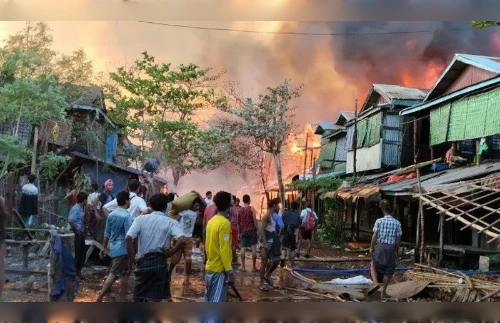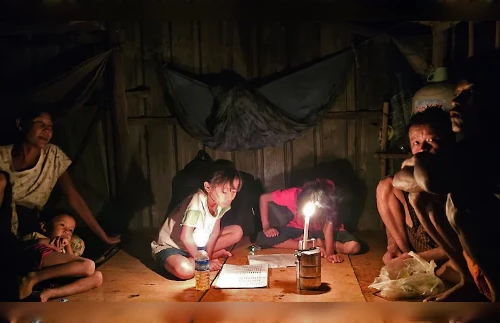Taufan Bustan/Palu,Indonesia

The death toll from a fire at a China-owned nickel smelter in Indonesia’s Central Sulawesi province has risen to 18, with 44 others injured, officials said Tuesday.
The fire at the PT Indonesia Tsingshan Stainless Steel plant in Morowali regency on Sunday morning claimed the lives of 10 Indonesian workers and eight Chinese workers, according to Dedy Kurniawan, the spokesman for the industrial complex where the plant is located.
“Today there were two more deaths – one Indonesian and one Chinese. So, the total number of deaths is 18 as of today” he told BenarNews, adding the cause of the fire was still being investigated.
Preliminary investigations suggested that molten metal residue, or slag, leaked from the smelter’s furnace and came into contact with flammable materials, which caused a furnace wall to collapse and the subsequent blaze, Kurniawan said on Sunday.
Indonesia holds the world’s largest reserves of nickel, which are crucial for electric vehicle batteries, and wants to become a global leader in nickel production.
But Sunday’s fire is the latest in a series of accidents that have raised concerns about safety in Indonesia’s largest nickel processing area, where Chinese firms are big investors.
The PT Indonesia Morowali Industrial Park (IMIP), where the facility is located, is a joint venture between China’s Tsingshan Steel Group and Indonesia’s Bintang Delapan Group.
The integrated nickel-based industrial park covers 2,000 hectares (4,942 acres) and employs more than 81,000 people, including 10,000 foreign workers, mostly from China.
Between 2019 to 2023, more than 30 workers died at two nickel plants with majority Chinese ownership in Morowali and North Morowali regencies, with 20 fatalities occurring at IMIP, according to Muhammad Taufik, the director of the Central Sulawesi Mining Action Network, an Indonesian environmental group.
Investigators from regional and national police, forensic specialists and medical personnel were processing the scene Monday, said provincial police chief Inspector Gen. Agus Nugroho.
“To facilitate the investigation the plant will be closed for an indefinite period pending the results,” Agus told BenarNews.
A separate team including representatives from the Manpower Ministry, the Chinese embassy and industry experts was also investigating, said Arnold Firdaus, head of the provincial manpower office.
“God willing, we will have complete results in a few days. The team is working hard,” he said.
Firdaus cautioned against premature conclusions about the cause, though speculation has centered on human error. He said investigators were focused on three key areas: the workplace environment, the action of workers and equipment malfunctions.

Arnold acknowledged the industry’s susceptibility to accidents but said “robust occupational health and safety measures” were in place at the industrial complex and regularly monitored.
Cross-sectoral collaboration was needed to address the challenges of worker safety in the nickel industry, he said.
“We must address not only technical flaws but also environmental factors that can contribute to human error,” he said.
Ferdy Hasiman, a mining researcher at Alpha Research Database Indonesia, said Chinese companies in the nickel industry were often opaque about their operations.
“We don’t know what kind of technology they’re using, or what their safety procedures are,” Ferdy said. “They’re very closed off.”
He called on industry players and the government to demand transparency from the companies.
“I cannot analyze the situation in Morowali because I have never been allowed inside, unlike other mining companies …which are known for their strict standard operating procedures and risk mitigation,” he said.
In a speech at Georgetown University in Washington D.C. in November, President Joko “Jokowi” Widodo pitched the country’s nickel industry as a way to advance the green economy.
Chinese investment has come with technology transfers, created jobs and developed local infrastructure in Indonesia.
But concerns about environmental degradation, safety practices and working conditions have dogged the sector in Southeast Asia’s largest economy, where China is a big investor.
China is a big investor in an array of Indonesian projects through its Belt and Road Initiative, a globe-spanning infrastructure-building program.
In 2022, more than 42,000 Chinese were working in Indonesia, accounting for about 44% of all expatriates in the country, according to the Ministry of Manpower.
Copyright ©2015-2022, BenarNews. Used with the permission of BenarNews.














